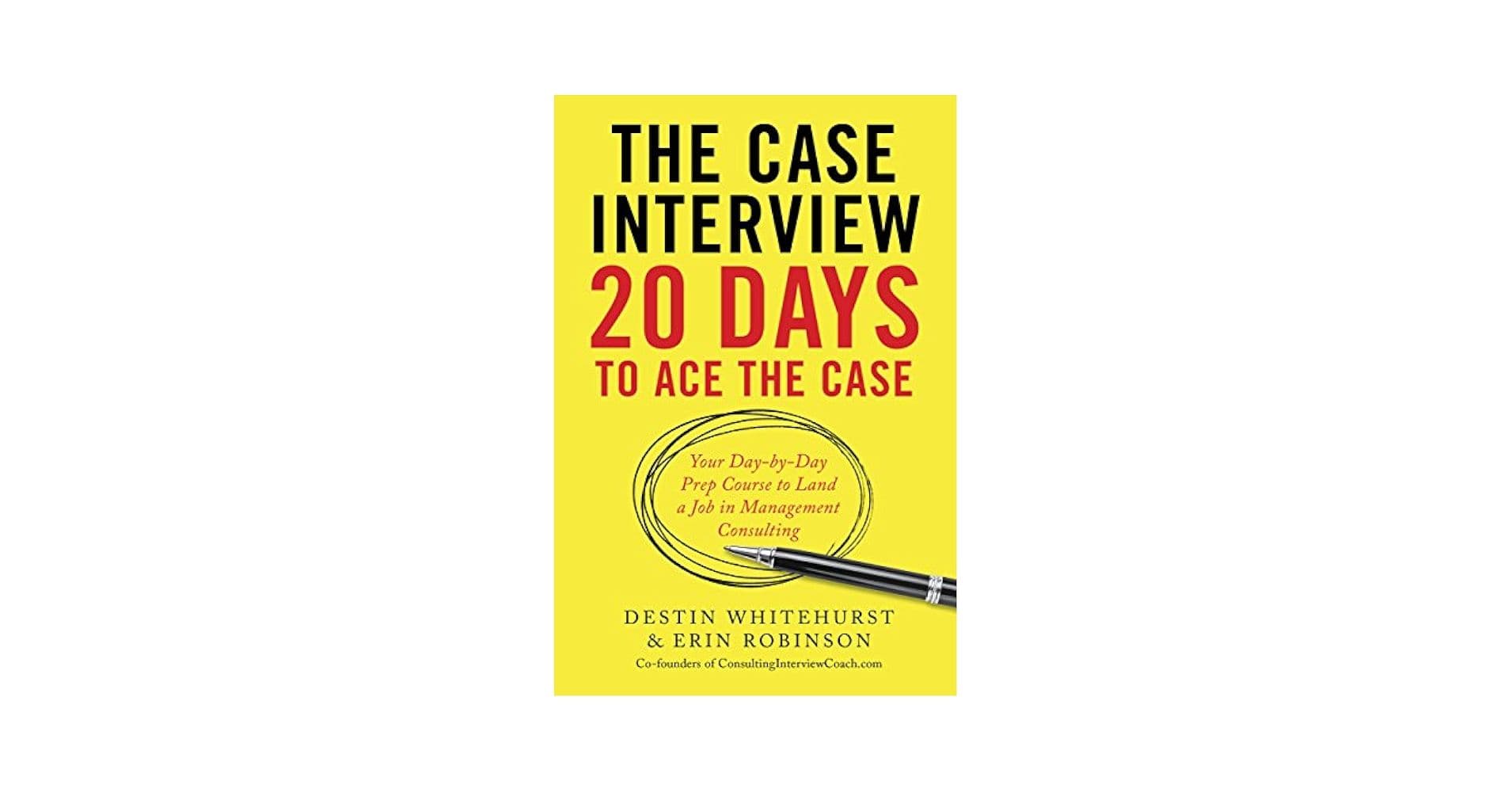
40 Management Consulting Interview Questions and Answers You Should Know

CaseTutor Team
You sit down for a case, and the interviewer slides over a messy client brief about falling margins or a sudden market shift. Consulting Case Frameworks provide a straightforward approach to breaking down problems into manageable parts, conducting quick quantitative analyses, and delivering structured recommendations. This guide lays out common management consulting interview questions, from market sizing and profitability puzzles to fit and behavioral queries, with sample answers and practice tactics so you can study with purpose and build genuine confidence. Ready to sharpen your case skills?
CaseTutor’s land your dream job provides guided practice cases, feedback on structuring and communication, timed drills, and mock interviews to help you land your dream job.
40 Management Consulting Interview Questions

40 Management Consulting Interview Questions
Management consulting interviews test candidates on multiple fronts, including cultural fit, behavioural skills, market analysis, and practical problem-solving through case studies.
Fit Questions
Fit questions determine if you align well with the consulting firm's culture, values, and client approach. Interviewers aim to find candidates who will thrive in their specific environment and projects. These questions often focus on your motivation, experience, and long-term goals.
- •Why are you interested in firm X specifically?
- •What draws you to a career in consulting?
- •Can you walk me through your resume?
- •Share something about yourself that isn’t on your resume.
- •What do you consider your greatest accomplishment so far?
- •Why have you chosen this particular location?
- •What are your career plans for the next five years?
- •Describe your experience managing client relationships and how you maintain client satisfaction over time.
- •How do you adapt your consulting method according to varying client needs and industries?
- •Tell me about a significant project you led, your role, and what the outcomes were.
- •Which consulting methodologies or frameworks are you most familiar with? How have you applied them previously?
- •Do you have any formal education or training in project management? How have you used that in your consulting engagements?
Behavioral (PEI) Questions
Behavioral or Personal Experience Interview questions examine your leadership skills, initiative, and ability to influence or handle challenges. They help firms identify candidates with strong interpersonal and problem-solving skills.
- •Describe a time when you changed someone’s opinion.
- •Talk about a situation where you disagreed with a colleague.
- •When have you had to resolve conflict within a team?
- •Share an example of working under a tight deadline that challenged you.
- •Tell me about a crisis you managed and how you handled it.
- •What has been the biggest obstacle in your career, and how did you overcome it?
- •Provide an example of influencing others without formal authority.
- •Describe a project you led and your role in it.
- •Can you tell me about a time you adapted to significant changes in a project? What steps did you take?
- •Share a situation where you motivated your team during difficult times.
- •How did you manage a project that was behind schedule and bring it back on track?
- •Describe a tough decision you made when under pressure.
Market Sizing Questions
These questions test quantitative reasoning and structured problem-solving skills with no given data, relying on logical estimates and assumptions.
- •Estimate how many t-shirts are sold annually in New York City.
- •How many dentists currently work in the UK?
- •What is the annual market size of smartphones in the USA?
- •Calculate the market size for televisions in Poland.
- •Estimate the market potential for weddings in the UK.
- •How large is the market for medical consumables used by GP practices?
- •What is the number of women golfers in the USA?
- •Calculate the size of the sandwich market in India.
Case Interview Questions
Case interviews mimic real consulting scenarios where you must analyse a business problem and propose actionable solutions. These start with a broad context and develop through probing questions.
- •Should the Diconsa network be leveraged to provide financial services? (McKinsey)
- •Should SuperSoda launch a new sports drink product? If yes, how? (McKinsey)
- •What strategy should Foods Inc. adopt for its cereal distribution? (BCG)
- •How can GenCo increase its revenues? (BCG)
- •Would it be advisable for your friend to open a coffee shop in Cambridge? (Bain)
- •Why have FashionCo’s revenues declined over the past five years, and what steps should they take? (Bain)
- •What strategic changes should Duraflex implement for its work boot products? (Deloitte)
- •Why are profits declining at WumbleWorld theme park, and how should they recover? (Oliver Wyman)
Related Reading
- •Consulting Case Frameworks
- •Bcg Case Interview Prep
- •Why Consulting Interview Question
- •How to Break Into Consulting
5 Sample Questions and Answers

Sample Questions and Answers
1. Commitment to consulting
Interviewers ask this to understand your genuine interest and commitment to consulting.
Sample Answer
"I am drawn to consulting because it allows me to tackle complex business challenges and deliver value to diverse clients. I thrive in environments where I can analyse issues deeply, collaborate with stakeholders, and develop tailored solutions. For instance, in a previous role, I helped a small company boost its customer base by 10% through a focused marketing strategy. This impact motivates me, and I look forward to applying my skills to larger-scale projects and organisations."
2. Describe a Time You Struggled to Meet a Deadline
This behavioural question assesses your stress management and learning capacity, typically approached via the STAR method (Situation, Task, Action, Result).
Sample Answer
"In one project, I underestimated the time required to complete a deliverable while juggling other tasks. One day before the deadline, I realised I couldn’t finish on time and immediately informed my supervisor. We quickly organised additional support from colleagues. Although it required late hours, we delivered successfully. From this experience, I learned the importance of realistic time planning and enhanced my time-tracking methods. Since then, I have consistently met all deadlines."
3. How Would You Estimate the Number of Cups of Coffee Consumed in New York City Last Week?
Market sizing questions evaluate your logical reasoning and estimation skills rather than exact answers.
Sample Answer
"I would start by estimating New York City’s population at about 10 million. Assuming 40% actively drink coffee, that gives 4 million coffee drinkers. If each drinks an average of 2 cups daily, that’s 8 million cups per day. Multiplying by 7 days yields 56 million cups per week. I’d note assumptions like uniform daily consumption, although weekends might see lower intake. Clarifying such variables helps refine the estimate."
4. How Do You Adapt to Different Client Cultures During Projects?
This question tests your interpersonal and cultural adaptability, crucial for consulting success.
Sample Answer
"Before starting, I research the client’s mission and cultural norms through online resources and industry contacts. I then reflect on how to adjust my communication style—for example, some clients prefer direct emails, others value informal chats to build rapport. Throughout the engagement, I remain flexible, observing and adapting to their preferences to foster trust and collaboration, ensuring project alignment and smoother interactions."
5. What Would You Do If You Found Yourself Behind Schedule on a Project?
Interviewers want to see your problem-solving and communication skills under pressure.
Sample Answer
"If I notice a delay, I first analyse the causes and priorities to see if reprioritisation is possible. I then communicate promptly with my team and stakeholders, providing a realistic new timeline. I explore options like reallocating resources or simplifying deliverables to manage the timeline. Transparency and proactive problem-solving help maintain trust and project momentum."
Related Reading
How to Prepare for a Management Consulting Interview

How to Prepare for a Management Consulting Interview
Own a Repeatable Framework
Begin each case with a concise roadmap that clarifies the objective, states your initial hypothesis, outlines the structure to be used, and lists the necessary data. Use issue trees and MECE thinking to break problems into revenue and cost drivers, market segments, operations, and customer behavior. Apply the hypothesis-driven approach: form a plausible answer quickly, then test it with targeted analysis and numbers. For fit and behavioural questions, use a headline plus the Situation, Action, Result pattern, and add a single learning or impact item to show growth. Keep a small set of go-to frameworks for profitability, market entry, pricing, and operations, but avoid force-fitting a framework when a custom issue tree fits better.
Practice Out Loud Until It Sounds Natural
Run timed 20 or 30-minute cases speaking aloud and recording yourself, such as practice clarifying questions, data requests, and transitions from analysis to synthesis. Drill mental math and back-of-the-envelope estimation until calculations are quick and tidy; use rounding, percents, and per-person averages as shortcuts. For market sizing, use two methods, such as top-down from population or total spend, and bottom-up from unit economics; always explicitly state assumptions and do a quick sanity check. Review your recordings using a checklist that assesses structure, logic, communication, and math, and revise any sections that feel disorganized.
Pressure Test with Peers
Exchange mock interviews with peers who can play the interviewer and candidate. Ask your partner to interrupt you with follow-up questions, push on assumptions, or change the case midstream. Create a simple scoring rubric for structure, analytical rigor, math accuracy, and communication to ensure objective feedback. Record the session, compare your verbal explanations to the rubric, and then rerun the same case to try different framing or a tighter synthesis. Peer practice exposes gaps you miss when working alone and helps you build conversational control.
Practice with Former MBB Interviewers
Seek coaches who have conducted actual interviews at your target firms or who have reviewed thousands of case interviews. Request tailored feedback on problem-solving, personal experience interview content, and synthesis style specific to each firm. Use coaching time to rehearse PEI or fit stories until your headline and impact are crisp, and request annotated transcripts or personalized feedback reports that identify recurring weak spots. Focus sessions on the leash points: clarity of hypothesis, speed of math, structure of your recommendation, and how you handle interruptions.
Practical Drills and Resources to Use Every Week
Rotate practice types during the week, such as one solo case, one peer mock, one coached session, plus 30 minutes of mental math and one market sizing set. Create a concise cheat sheet featuring six core templates, including profitability, market entry, growth, pricing, manufacturing or operations, and stakeholder mapping. Maintain an error log to track recurring logic or arithmetic mistakes, and implement corrective drills until errors cease. Read short business articles and practice summarizing them in two minutes to sharpen synthesis and the ability to present recommendations clearly.
Quick Tactics for Behavioural and Fit Interview Questions
Begin with a one-sentence headline that clearly states the outcome and your role, followed by a concise context, detailed actions, and a concrete result, along with what you learned. For leadership and teamwork stories highlight conflicts you resolved, trade-offs you managed, and how you influenced others without authority. Use numbers and timelines whenever possible and show the client or business impact. Prepare three or four stories that can be adapted to common prompts about leadership, failure, overcoming obstacles, and sustained impact.
Feedback Loops that Speed Improvement
After each mock, capture three things: one structural fix, one math or analysis fix, and one communication fix. Practice that exact correction in the next session, inside a short drill. Use objective measures, such as the percent of time spent talking vs listening, time to first hypothesis, and error rate in calculations, to track progress. Ask interviewers for actionable micro feedback rather than vague praise so you can iterate quickly.
Skip the $5,000 case coach and land your consulting offer anyway; CaseTutor gives you fully conversational AI interviews that mirror real McKinsey, BCG, and Bain sessions, complete with personalized feedback reports and a custom roadmap to fix your weak spots. While others spend thousands on human coaches or waste time with static case books, you'll master the art of thinking out loud through 100-plus realistic cases and start to land your dream job.
Related Reading
Get your Dream Job with the help of CaseTutor
CaseTutor gives you fully conversational AI interviews that mirror real McKinsey, BCG, and Bain sessions, complete with personalized feedback reports and a custom roadmap to fix your weak spots. While others spend thousands on human coaches or waste time with static case books, you'll master the art of thinking out loud through 100-plus realistic cases. Perfect for students, new grads, and early career professionals looking to transition into consulting, product, or business operations. Start practicing like the pros today; your dream offer is just a conversation away.
How CaseTutor Replaces Costly One-on-One Coaching
Human coaches offer nuance but cost thousands and scale poorly. CaseTutor delivers targeted, repeated practice with objective scoring and immediate feedback. You can repeat the same case with different prompts, track improvement, and practice until your synthesis becomes crisp. The platform complements occasional human review if you want a capstone check before interviews.
How This Prepares You for Management Consulting Interview Questions
The program covers typical case interview prompts, behavioral and fit questions, technical math checks, and market sizing drills. It trains you to structure answers, quantify assumptions, build revenue and cost models, and present recommendations in a client-ready way. You practice interviewer follow-ups, respond to pressure, and polish communication for both candidate evaluation and client-facing conversations.
Sample Case Types and Question Formats You Will Face
- •Market sizing and estimation to test rough math and bounding techniques.
- •Profitability analysis to separate revenue and cost drivers and prioritize levers.
- •Market entry and go-to-market strategy to evaluate demand, competition, and channel choices.
- •Operations improvement and supply chain to find bottlenecks and quick wins.
- •Merger and acquisition, as well as due diligence, prompt assessment of synergies and valuation logic.
- •Behavioral fit drills for leadership, conflict, and problem ownership scenarios.
Practice Routine: How to Use CaseTutor Efficiently
Begin with daily short sessions that focus on one skill, such as structuring or mental math. Mix full-length cases with targeted drills for 30 to 90 minutes, depending on your stage. Record responses, review the feedback report, and follow the roadmap tasks that the system assigns. Use role swapping and replays to practice interviewer cues and synthesis under time pressure.
Scoring Metrics and Objective Progress Tracking
CaseTutor scores structure clarity, hypothesis focus, quantitative accuracy, and communication. It tracks time to formulate a framework, error rate on back-of-the-envelope math, and quality of final recommendation. These metrics let you compare sessions and see where improvement is steady or stalled.
How This Improves Behavioral and Fit Interview Skills
The platform simulates STAR-style prompts and follow-up probes. It asks for specific metrics, asks you to unpack actions and outcomes, and evaluates how you tie stories to the consultant mindset and client impact. You receive feedback on storytelling, confidence, and alignment with firm values.
Security and Data Privacy Controls for Your Practice
Sessions are private and stored under secure access controls. You control sharing for coach review or peer practice. The system anonymizes case responses used for product improvement and protects personal data with standard industry measures.
Who Benefits Most from CaseTutor
Students applying to top firms, new grads targeting consulting roles, and early career professionals shifting into product or business operations will all find value. The tool helps candidates who need to build consulting logic, get comfortable speaking their thought process, or polish mental math before final rounds.
Pricing and Return on Investment
Compared to multiple one-on-one coaching sessions, the subscription model scales for intensive practice without a significant upfront cost. Think of the platform as a practice gym that measures reps, tracks improvement, and prevents wasted time in static case books.
Common Candidate Questions Answered
- •How many cases should I do per week to see improvement? Aim for consistency. Four to six focused cases, along with targeted drills on math and frameworks, produce measurable gains each week.
- •Can I simulate partner-level interviews? Yes. The platform can raise difficulty, shorten time, and add pressure to mimic late-stage rounds.
- •Will this replace mock interviews with humans? It reduces the need for a large number of human mocks and sharpens your performance before you invest in a final live review.
Want to try a realistic case session or see a sample feedback report?

